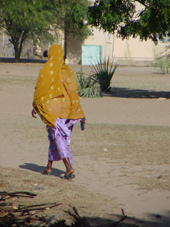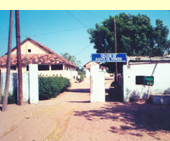
Building a Model for Community-Level Postabortion Care
“I can say that I saved a life. I treated a woman who was bleeding profusely. She was worried and her parents were worried. Performing MVA and rapidly stabilizing her with an IV gave confidence to the woman, and she thanked me a lot for having saved her life.”
Through the PRIME II Project, Senegalese health center nurse Madame Bâ Fatou Diouf has been trained in postabortion care, including manual vacuum aspiration (MVA), counseling and postabortion family planning service delivery. Having an additional trained postabortion care provider enables the Sokone district health center to offer 24-hour access to MVA services that can save women’s lives, along with contraceptive services to help women prevent future unintended pregnancies. The health center accepts referrals from health huts and health posts that are the focus of an initiative by PRIME to expand family planning services and selected postabortion care activities to rural facilities where MVA for treatment of postabortion complications cannot be offered.
With the Senegalese Ministry of Health, PRIME II is developing and testing a model for community-level postabortion care in Sokone that relies on high-quality family planning services to help women prevent unwanted pregnancies. This care meshes with fully functional referral and counter-referral systems among health huts, health posts and the health center for women needing treatment for complications from unsafe or incomplete abortion. Making certain that treatment services are available before creating additional demand is an essential part of PRIME’s philosophy. To ensure that a provider trained in PAC, including MVA, would always be on call at the referral health center, PRIME sponsored Mme Diouf’s participation in a six-day training course in Dakar organized by PRIME partner EngenderHealth in March 2003.
“Since my training, I resolve problems myself when I am on call,” says Diouf, who performed five of the 24 MVA procedures for women seeking treatment for postabortion complications at the health center in April and May. “Before, I would have to try and find a doctor or reproductive health coordinator who had been trained. My training has reinforced our team and increased the availability of MVA. I haven’t encountered difficulties and I also do family planning counseling to make sure the woman understands that she can become pregnant as soon as 11 days after treatment.”
The Sokone Health Center serves 14 health posts, typically staffed by a head nurse and one or two matrons. Each health post supervises several community-based health huts. PRIME is training matrons and community members who work at the health huts in activating transportation and referral networks, informing women about where to obtain family planning, and identifying the danger signs of obstetric emergencies. Since the matrons at the health huts are often illiterate, pictographic referral forms were developed and pre-tested for comprehension and acceptability. Health post nurses, in turn, are trained in family planning counseling and services and in stabilizing women with postabortion complications for transport to the health center.
PRIME II’s model for establishing and sustaining family planning and postabortion care services in the health posts and huts relies on community-provider partnerships supported by the Center for Rural Polyvalent Expansion (CERP), a program of the Senegalese Ministry of the Interior. Drawing on its relationships with mayors, village chiefs, religious leaders, women’s associations and other community-based groups, CERP plays a key role in rallying local authorities to maintain transportation plans and funds for obstetric emergencies and helping health post nurses convey effective, community-supported messages about family planning.
Because the program fosters community responsiveness to obstetric emergencies in many of Sokone’s 194 villages, Bâ Fatou Diouf will have more opportunities for using her training to stabilize women with life-threatening complications. Her knowledge and skills in family planning counseling offer her the chance to save women’s lives in less dramatic fashion by reducing the number of unwanted pregnancies that often result in unsafe abortions. Preliminary results from the Sokone Health Center are encouraging: the percentage of women treated for postabortion complications who accepted a modern family planning method after counseling rose to 69% in May from just 17% in January.
The PRIME II Project, funded by USAID and implemented by IntraHealth International and the PRIME partners, works around the world to strengthen the performance of primary providers as they strive to improve family planning and reproductive health services in their communities.
PRIME Voices #21, Senegal: Building a Model for Community-Level Postabortion Care, 7/28/03.
|












